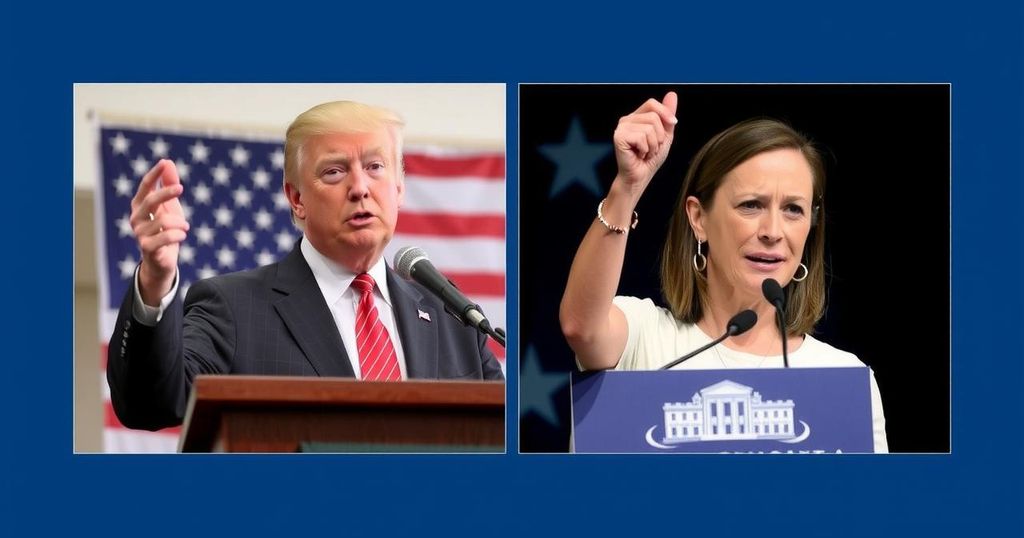Virginia’s Special Elections: A Test of Party Strength Ahead of 2025 Gubernatorial Race

Virginia’s special elections serve as a crucial test of partisan dynamics ahead of the 2025 gubernatorial race. Key contests involve Democrats Kannan Srinivasan and J.J. Singh, as well as Republican Luther Cifers in a Republican-leaning district. Significant issues include education funding and reproductive rights, crucial to both parties’ platforms. The outcomes could signal a shift towards Republican momentum or reinforce Democratic control in the state legislature.
Virginia’s special elections are currently taking place, serving as a critical barometer of voter sentiment prior to the 2025 gubernatorial election. With the potential for a Republican-led Congress and White House, these contests may either consolidate Democratic control of the state legislature or indicate a shift toward Republican influence. Two notable races include the 32nd Senate District, where Del. Kannan Srinivasan is contending against Republican Tumay Harding, and the 26th House District, featuring Democrat J.J. Singh versus Republican Ram Venkatachalam. Furthermore, in the Republican-leaning 10th Senate District, Democrat Jack Trammell faces GOP nominee Luther Cifers, making this race particularly compelling due to the partisan dynamics at play.
Amidst a projected $2 billion surplus, legislators are deliberating funding allocations, with Democrats advocating for increased K-12 educational services while both parties seek potential tax relief measures. Moreover, reproductive rights have emerged as a pivotal theme in these elections. Candidates Srinivasan and Singh have committed to protecting abortion access, whereas Republican Venkatachalam has yet to clarify his stance on the issue. Harding, similarly, emphasizes her support for policies aimed at reducing the need for abortions while affirming her position that life begins at conception.
In the 10th District, Democrat Trammell supports a constitutional amendment aimed at safeguarding abortion rights, in contrast to Republican Cifers, who opposes any exceptions to abortion. The Democratic majority within Virginia’s legislature is deemed vital for the advancement of this amendment, underscoring the significance of these special elections. While the issue of abortion transcends party boundaries, it predominantly reflects a partisan divide in Virginia’s political landscape, with many Republicans aligning with Governor Glenn Youngkin’s proposed abortion restrictions.
In light of the recent U.S. Supreme Court decision overturning federal abortion protections, this issue continues to dominate both state and national political dialogues, as various states strive to either reinforce or restrict reproductive rights. As the political landscape evolves, Virginia’s special elections serve as a crucial indicator of voter sentiment as the state approaches its gubernatorial race in 2025.
The context of Virginia’s special elections is significant in light of the upcoming 2025 gubernatorial race, offering insights into the prevailing political climate following the general election. Political analysts are closely observing these elections as they could dictate the direction of party strength and legislative priorities, especially given the national shift in sentiment towards Republicans as evidenced by their prospective control of Congress and the White House. The special elections are not only pivotal for local governance but also serve as a reflection of broader trends related to legislative control, particularly concerning issues such as education funding and reproductive rights, which have taken center stage in political debates.
In conclusion, Virginia’s special elections are a crucial litmus test for both major political parties ahead of the highly consequential gubernatorial race in 2025. The outcomes of these elections will likely influence legislative priorities including funding for education and the future of reproductive rights in the state. With key contests highlighting partisan divisions and critical issues shaping voter perspectives, these elections will be instrumental in establishing the political landscape for the years to come.
Original Source: virginiamercury.com








